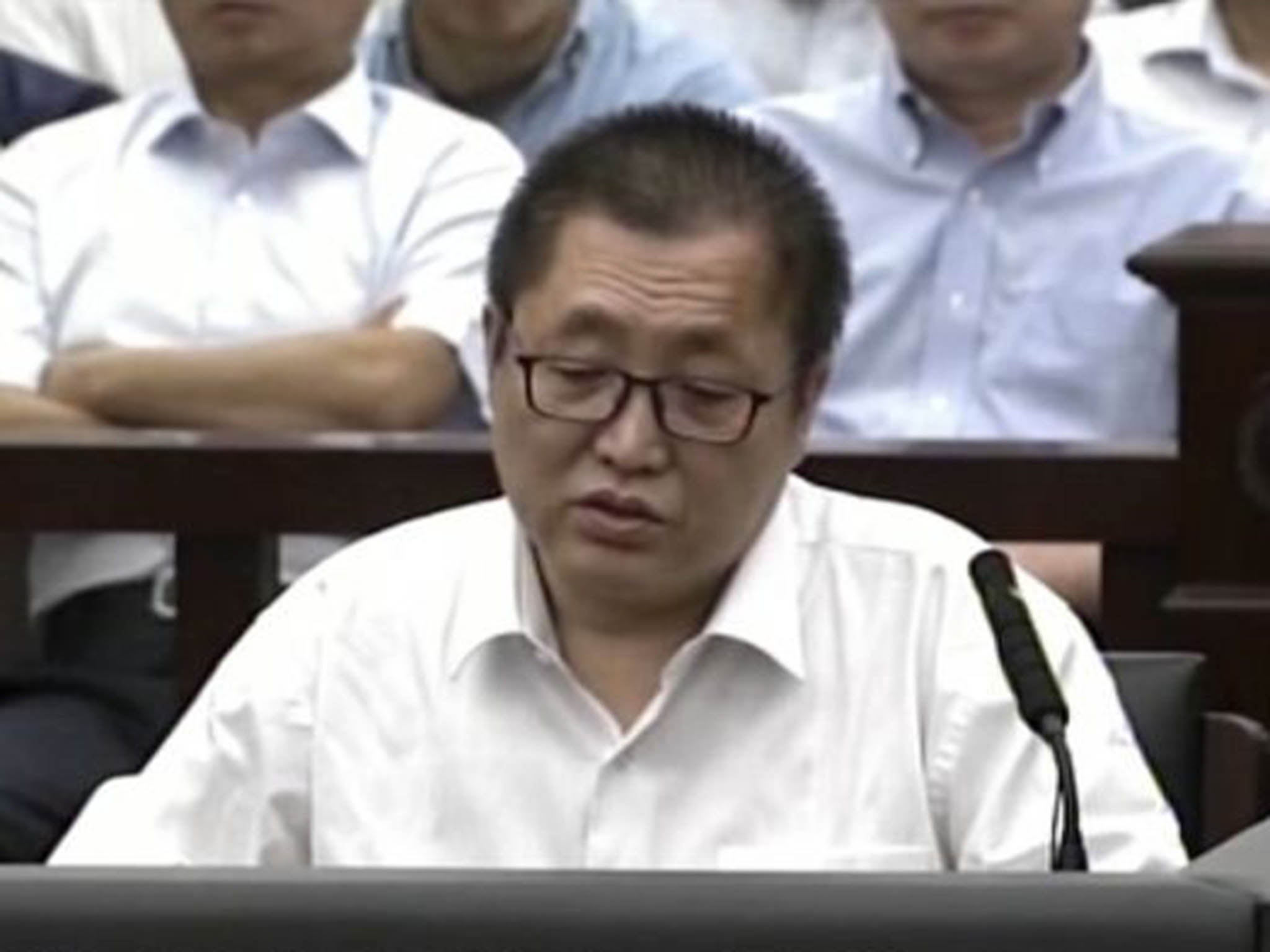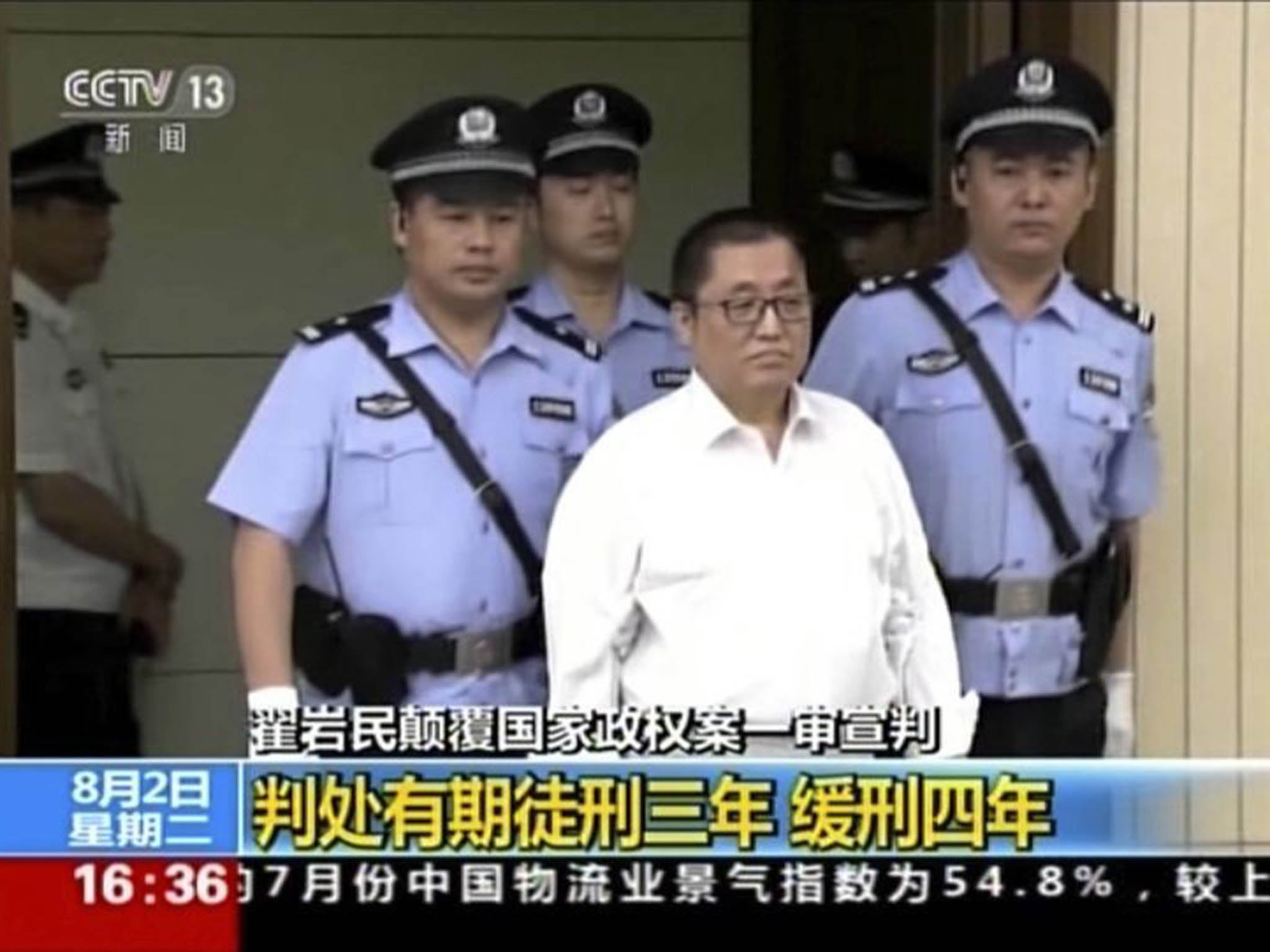Chinese human rights activist gets three-year suspended sentence after 'secret trial'
State media claims Zhai Yanmin confessed his group methodically hyped politically sensitive cases in bid to undermine Chinese state

A Chinese court issued a suspended three-year prison sentence to a human rights activist charged with subversion of state power after a brief trial Tuesday. It was the first publicly acknowledged hearing in a year-long case involving hundreds of rights activists that has been shrouded in secrecy.
The official Xinhua news agency said a court in the northern city of Tianjin issued the sentence to Zhai Yanmin, who was arrested in July last year as part of a nationwide government campaign against legal activists. About 300 lawyers and activists were initially seized and questioned before most were released.
Zhai's case is the first of four expected to be heard this week. Prosecutors announced in July they would try a lawyer, Zhou Shifeng of the Beijing law firm Fengrui that worked extensively on human rights cases, and three activists who worked with the firm, including Zhai. More than a dozen others remain jailed, their legal status uncertain.
Xinhua said Zhai confessed in court that the group of lawyers, citizens and petitioners who believed in “pushing the wall” – a Chinese expression for overthrowing the government – methodically hyped politically sensitive cases. It quoted him as saying they organised popular rallies during controversial human rights cases to draw international attention and undermine the Chinese state, remarks that echoed previous government accusations toward the group.
Xinhua said the court was told that Zhai, 55, and the three others “conspired and plotted to subvert state power”, and “established a systematic ideology, method and steps to achieve it”.
In a video from the trial shown on state television and posted on government websites, Zhai read a statement saying he accepted all the charges against him, was “extremely regretful” of his actions and would not appeal his sentence. Zhai said he would urge others not to be used by “hostile foreign forces” and domestic opportunists, or be blinded by “so-called democracy, human rights and justice”.
“I hope the court will give me an opportunity to correct my mistakes and start life anew,” Zhai said, standing in the defendant's box and flanked by two bailiffs.
The court permitted Hong Kong journalists to attend the session, although foreign diplomats were barred.
Zhai and his fellow activists worked alone or in affiliation with law firms to gather evidence of government abuses and lead clients and the disgruntled in protesting outside courts and government offices. Their actions were harshly denounced by the authorities as interference in the legal process.

Many wives of the detained activists say they and their retained lawyers have been denied access to the detainees for more than a year, receiving only occasional updates by word of mouth, while some family members seeking information have been briefly detained themselves. Zhai's wife, Liu Ermin, was taken into custody on Sunday night and returned late on Monday to her Beijing home, where she said she is effectively held under house arrest by security agents outside her door.
“It's unfair, it's too unfair,” she said in a text message upon learning of Zhai's verdict. She said she intends to appeal the verdict but does not know how to reach his government-appointed lawyer, whose identity has not been disclosed to relatives or in state media reports.
Zhai's three-year sentence was suspended for four years, meaning he will not go to prison but will have to live under considerable restrictions and supervision. He also will lose all political rights for the same period, making him ineligible to run for local councils or other offices. He can be sent to prison to serve his sentence if he disobeys the rules set for his release during the four-year period.
A three-year sentence is the minimum for people convicted of subversion, which carries a maximum sentence of life in prison.
“It is an unprecedentedly light sentence... almost a symbolic punishment,” said Beijing political commentator Zhang Lifan. That may be a deliberate move by the ruling Communist Party, which permits no political opposition, to demonstrate that those who cooperate can be treated leniently, while harsh penalties await those who refuse, Zhang said.
“The point is not whether you committed any crime, but whether you obeyed or not,” Zhang said.
The trial also fits a pattern established under the administration of President Xi Jinping to use more sophisticated legal means to attack perceived opponents, as it maintains pressure on activists and non-governmental organisations.
Police cordoned off the Tianjin No 2 Intermediate People's Court on Tuesday, one day after protesters flanked by foreign diplomats demanded more information about the cases.
The trial was attended by five foreign media outlets invited by the court and other observers, according to Xinhua, in an apparent attempt to address criticism from the activists' supporters about a near-total lack of transparency surrounding the cases.
It is not clear whether Zhai will be allowed to return home immediately. A lawyer and legal assistant who were recently released have been videoed apparently recanting their actions, but their whereabouts remain unknown.
AP
Join our commenting forum
Join thought-provoking conversations, follow other Independent readers and see their replies
Comments
Bookmark popover
Removed from bookmarks